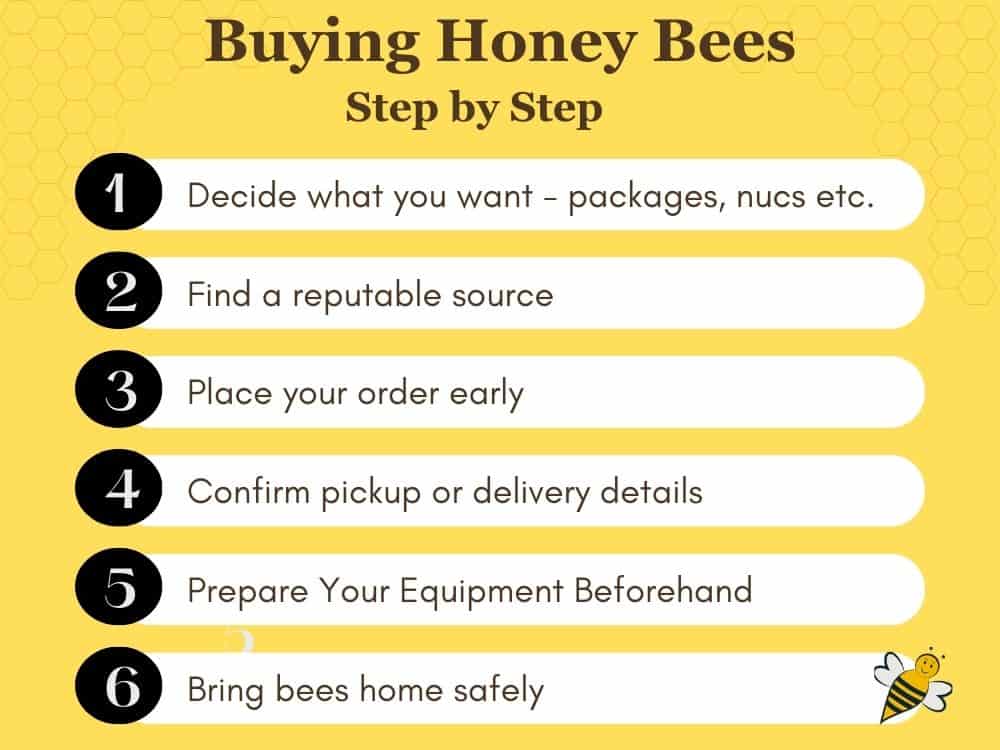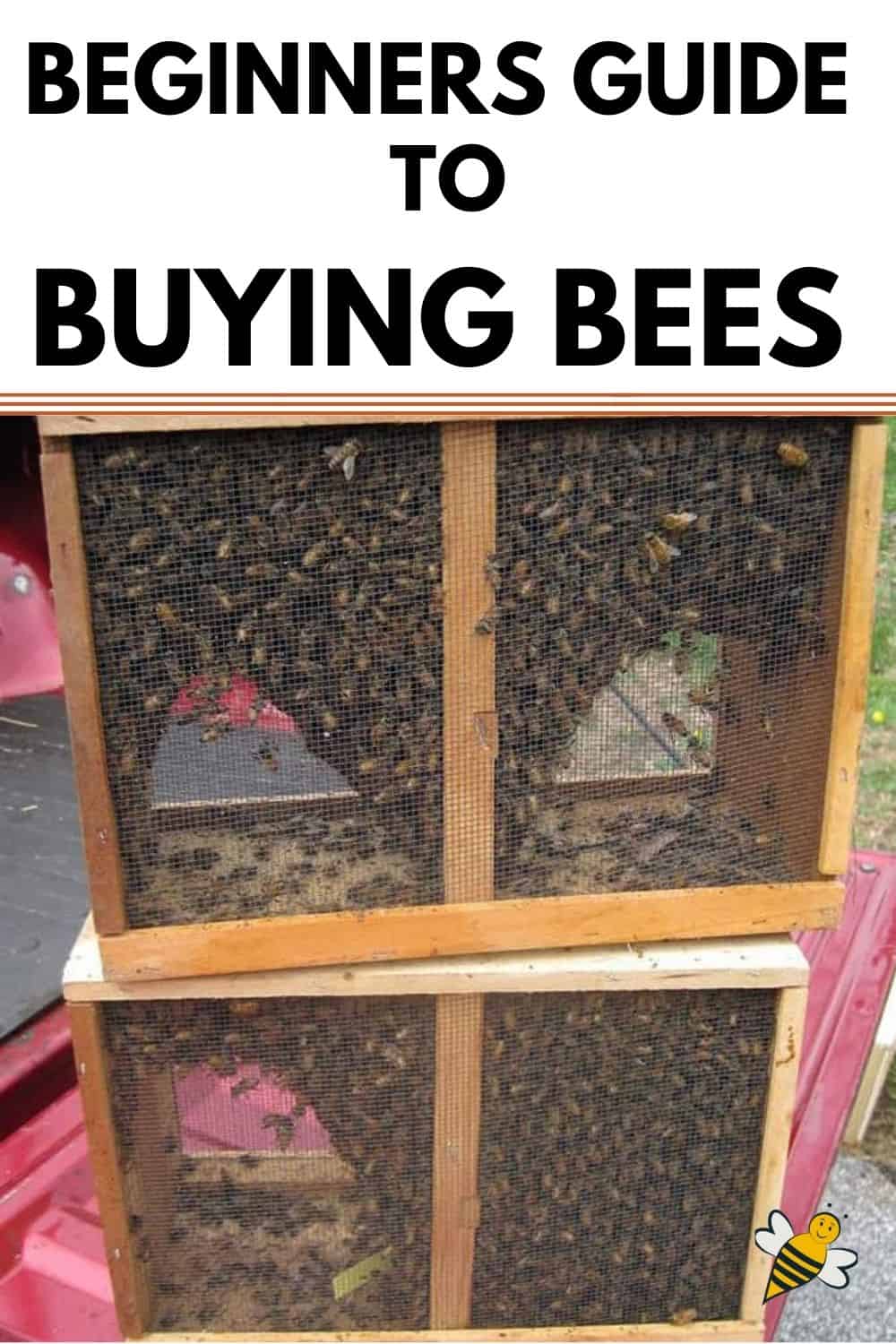How to Buy Bees for Your Hive
Becoming a beekeeper is an exciting time but before you can enjoy the adventure to it’s fullest you need bees for your hive. Buying honey bees is the most common way for beginner beekeepers to start. But, this can be a bit confusing – you can not just swing by the farm store and pick up a colony (at least not usually). Orders for bees take place weeks or months before actual bee arrival. In this overview, you will learn the two most common ways of purchasing bees to make sure you do not miss out.

As an experienced beekeeper, I have obtained bees in a variety of ways. Catching swarms is fun but not a sure thing – not my top recommendation for beginners. As you learn more about how to start beekeeping, you will realize why purchasing might be best for the first season.
Why Buying Bees is the First Step
You may wonder – why do I have to think about buying honey bees right now? I don’t even have my hive ready yet and I have a lot of other decisions to make.
The reason for ordering bees months in advance is that the early (Spring) delivery dates often sell out.
In many cases, the new beekeeper who waits until Spring to order – may be out of luck. Or at the very least, the bees may arrive much later in the season that is ideal.
Best Time to Order Bees
The best time to order honey bees for the next season is around Christmas. The month of January is a busy time for online bee orders. Certainly, have your order in before the end of February.
In most cases, you will have several delivery dates to choose from. Plan to pick up bees when most of the cold freezing weather is over for your region.
Southern beekeepers can take earlier dates while those in northern regions may be better off waiting until late April or Mid-May.
Sources for Ordering Honey Bees
The method you use for ordering bees will depend a bit on the resources close to where you live. If you have bee suppliers that sell equipment and bees seasonally, this is a good option.
You can pick up your order and save the bees the stress of going through any of the postal or shipping services.
Check with local beekeeping associations in your area – they will know where the suppliers are. Sometimes, local groups coordinate bulk orders for their members.
When local pickup is not an option, you can buy honey bees from online suppliers. Just do a search for honey bees for sale. Do be sure to read the fine print regarding payment, any guarantees, etc.

Packages, Nucs, Full Hive: The Basics
When you purchase honey bees, you will usually have 2 main choices: a package of bees or a nucleus colony (nuc).
- Package Bees come in a screened wooden box (sometimes plastic) and contains thousands of worker bees and a caged queen. They travel with a small can of sugar water for the trip.
This is a starter group – enough bees to start your hive. There are several pros and cons of buying package bees – this is the most common and economical option.
- Nuc Colonies are small established hives. They contain several frames of honeycomb with bees, brood and an accepted queen. A nuc has the possibility of building up into a full sized hive faster than a swarm or package.
However, nuc purchases are not always sunshine and roses. Be aware of the pros and cons of buying nucs too.
- Full-Sized Colony – Another way to buy bees is to purchase an established full hive. This can be a bit overwhelming to a new beekeeper as established hives are sometimes more defensive.
Also, anytime you purchase a hive with honeycomb, there is a risk of acquiring a bee disease in the hive. Or, to receive a box with any number of honey bee pests.
How the Ordering Process Works
Buying bees may sound complicated at first – but it really is easy to do. Timing is the most important factor because ordering early gives you the most option.
- Decide What You Want to Buy – packages, nucs – even the breed of type of honey bee you wish to raise will depend on your budget and availability. Most of us have “mutt bees” that are a mix of Italian, Carniolan bees and other genetics.
- Find a Reputable Source – Contact local beekeepers, read reviews and compare. Does the supplier have a good reputation for handing problems and a good reputation for actually delivering the bees on time? (Bad weather can delay deliveries – that is not the suppliers’ fault.)
- Place Your Order Early – Most bee orders are placed between January and early March. Paying in advance is common.
- Confirm Your Pickup Date – A good supplier will remind you of your delivery date or any delays. But Spring is a busy time – do you part and check on your order several weeks before delivery.
- Prepare Your Equipment Before Bees Arrive – Your hive should be assembled, painted (if desired) and set up ready for new occupants. This needs to happen a week before your bees arrive.
- Have a Pick Up Plan – If you are doing local pickup – plan to transport bees in a well-ventilated vehicle – keep them cool. Do not stop to eat lunch on the way home and leave bees in the hot trunk or car interior.

Ordering Bees Online
Being able to pick up in person is great because you get to see exactly what you are getting. However, you can buy honey bees online and have them shipped right to your front door.
The United States Postal Service has the honor of delivering many boxes of honey bees each year. Admittedly, your postal carrier may not be thrilled with the job.
Ask questions before placing your order – not every carrier promises live delivery. Read the terms of service carefully.
You want to know: how they will be shipped, are they insured, if they are insured and the package arrives damaged – do you have to file a claim with the post office or will the supplier replace them?
Prepare Yourself Before They Arrive
In addition to getting all your “bee stuff” ready, you need to prepare yourself too. Consider taking some bee classes – they can be very helpful.
Also, refresh the procedure for how to install a package of bees, or how to install a nuc hive before you bring them home. This ensures that you have everything you need on hand and all of your beekeeping equipment ready.
As you learn to manage your colony, there may come a time when you want to buy a new queen bee. That’s a story for another day but it is much easier than transporting bees!
FAQs
Bee prices depend on the option you choose (packages, nucs, full hive) the time of year and availability. Package prices vary from $125 to $200 plus shipping (if applicable.) Expect nucs to be in the $200 and up range and of course a full hive is often over $250.
Yes, packages of bees can be shipped in specially designed travel cages containing enough food for the trip.
Not usually. A package of bees arrives in a simple travel cage, while a nuc comes with several frames of bees, brood and good – but both require a full hive setup waiting at home.
Final Thoughts
Unless you want to get involved in bee lining and stomp through the forest, you will likely need to order some bees for your new hive. There are several ways to do it. A common saying is: “If there is one thing beekeepers can agree on – it’s that beekeepers can’t agree on one thing” ! Start with healthy bees from a reputable supplier and your backyard will be buzzing in no time.

